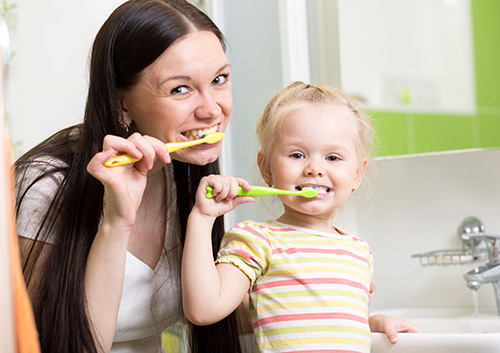
When working out, studying late, or any time we feel like a bit of a boost would come in handy, energy drinks are a common go-to for many teens and adults. Energy drinks promise more focus and vitality, all wrapped up in clever names and eye-catching graphic designs. What they can’t promise, though, is a drink that’s good for your dental health.
Why? Because most energy drinks come with a high concentration of caffeine, acids, and/or sugar.
Before we talk about your dental health, a word about caffeine. Too much caffeine in a short period can leave us jittery, anxious, irritable, and sleepless. A cup of coffee has about 100 mg of caffeine, and some energy drinks have three to four times that much.
While the recommended daily limit for adults who aren’t pregnant is 400 mg of caffeine, doctors suggest a much lower limit for children and teenagers. Among other reasons, sleep is especially important for developing brains and bodies, and caffeine interferes with healthy sleep.
You might have to go online to find out how various energy drinks measure up and compare in terms of caffeine, but taking the time to check them out is well worth it. Now, back to your dental health!
Many energy drinks are very acidic. The tart flavors of energy drinks might please your palate, but they attack your enamel.
Our mouths are their healthiest when our saliva is neutral, balanced between acidic and basic on the pH scale. That’s somewhere around a 7 on a scale of 0-14, where lower numbers mean more acidic conditions. That burning feeling we get from acid reflux when stomach acids back up? That’s because stomach acid is a 1-2 on the pH scale. Many energy drinks rate an eye-opening (and not in an energetic way!) 1.5-3.5 on the pH scale, which means your teeth are bathing in acids.
Even tooth enamel, the strongest substance in the body, can’t stand up to these acids, because acids break down the mineral structure of your enamel. If your teeth are more sensitive to heat and cold, if they appear darker as the white outer layer of enamel thins, if your dentist has discovered weak spots in your enamel—you might be experiencing demineralization. Once enamel is gone, it can’t be replaced.
A well-known source of quick energy is sugar. A little more biology and chemistry here—sugar is a food which our bodies can break down quickly. And when sugar molecules break down, this breakdown releases energy—energy which we use to fuel essential bodily functions. This quick burst of sugar energy is why many energy drinks contain lots of added sugar. Some brands have more than 60 grams of sugar per serving—and 60 grams is almost 5 tablespoons!
We get all the sugar we require for our daily energy needs from the natural sugars found in fruits, dairy, even some vegetables and grains. With added sugars, we’re just adding empty calories, affecting the balance of our blood sugar and hormones, and increasing the risk of chronic health conditions—all while providing a convenient food source for the bacteria in plaque.
Because, just like our bodies find it easy to convert sugar to energy, the oral bacteria which cause cavities find it easy to convert sugar to acids. And just like the acids in foods, these acids attack the tooth’s mineral structure and break down its strength. Eventually, the weak spots in enamel grow larger and deeper and become cavities.
While most labels don’t let you know how much caffeine you’re getting, or the pH of the liquid inside, you can see how much sugar is being added to your diet with every can or bottle. Do look for added sugars before you choose your beverages.
If you have several energy drinks a day, a soft drink or two, plus the occasional sports drink—you’re bathing your teeth in acids and sugar all day long. With any beverage high in sugars and acids, limit your consumption. Rinse with water afterward, and don’t brush for about an hour to give your enamel time to remineralize after being exposed to the acids in your drink.
Better yet, choose healthier alternatives. Water is still the best way to hydrate. Try adding protein and carbs to your diet for more energy. Make sure you’re getting the vitamins you need with a balanced diet. If you see signs of enamel erosion, talk to Drs. Emily Ruthven and Daniel Cepeda. The temporary boost you get from a bottle of caffeine, acids, and sugar might seem tempting, but it can have long-lasting consequences for your dental health!




